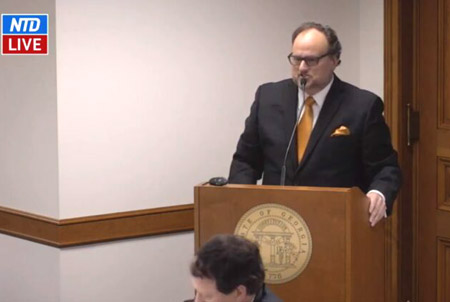by WorldTribune Staff, December 31, 2020
The Georgia state Senate’s Election Law Study Subcommittee on Wednesday unanimously passed a motion to request an audit of absentee ballots in Fulton County.
The motion asks Fulton County, the state’s largest, to make the ballots “available for inspection” through a method outlined during Wednesday’s election hearing by digital ID systems inventor Jovan Pulitzer.

Pulitzer said all absentee ballots in the state of Georgia could be forensically examined and fraudulent ones identified in just a matter of hours. He called on state officials to allow the examination.
“All of these problems that you’ve heard today can be corrected and detected now by the simplest of things. It takes you days or weeks to recount votes. Give me these 500,000 ballots, we’ll have them done in two hours,” Pulitzer said, apparently referring to the 528,777 absentee ballots cast in Fulton County.
During Wednesday’s hearing, Pulitzer said he was able to access in real time the Dominion system at a Georgia polling place.
Related: Dominion system hacked live during Georgia election hearing, December 30, 2020
Joe Biden leads in Georgia by less than 12,000 votes.
One of the Fulton County’s polling managers had previously told state lawmakers that she opened a box of mail-in ballots with a batch of 110 that were “pristine” and not folded, indicating that they were never put in secrecy envelopes, as is required.
Pulitzer said that he and his team can detect if that’s the case.
The Epoch Times noted in a Dec. 30 report that security camera footage from Fulton County on election night shows what appears to be tens of thousands of ballots being counted in the absence of party or state monitors.
“The video seems to show that election workers scanned the same batches of ballots repeatedly. This could be a legitimate action when there’s a scanning error in the batch, such as when the ballots get jammed in the scanner,” the report said. “In that scenario, the workers are supposed to discard the whole batch of scans and scan the ballots again, but the video quality makes it hard to discern if that was the case in each instance.”
Pulitzer said that he and his team could detect if that was the case as well.
“We would be able to tell if they were folded, if they were counterfeit, whether they were filled out by a human hand, whether they were printed by a machine, whether they were batch-fed continually over and over, we can detect every bit of that,” he testified.
The ballot paper itself, when scanned, becomes a piece of code, he explained. Every time the paper is physically handled, such as folded or written upon, the code would change and the change can be detected.
Pulitzer criticized Georgia authorities for refusing to allow a full-scale forensic audit.
“This is the historical artifact of a voter. And states are telling voters, ‘You have no right to that,’ ” he said.
“The very voter that pays your salary, that paid for that ballot, that paid for that piece of paper, and paid for the machine that you’re running it in. And so those people that pay your salary, that you work for, and do this for, you’re telling them, ‘You can’t look at them.’
“That is both unacceptable and un-American.”
Intelligence Brief __________ Replace The Media
